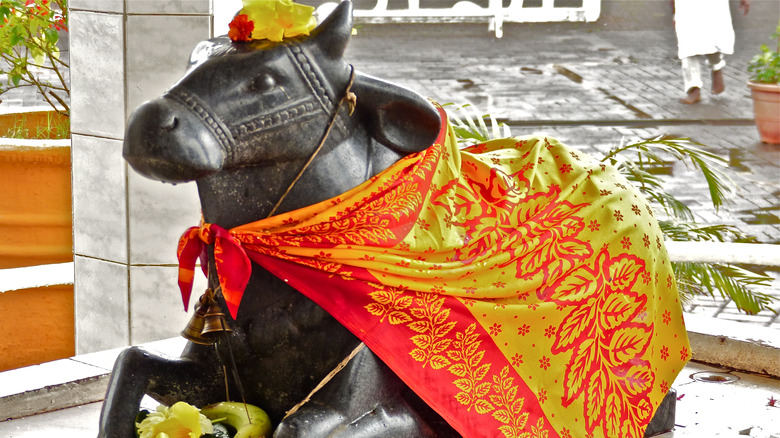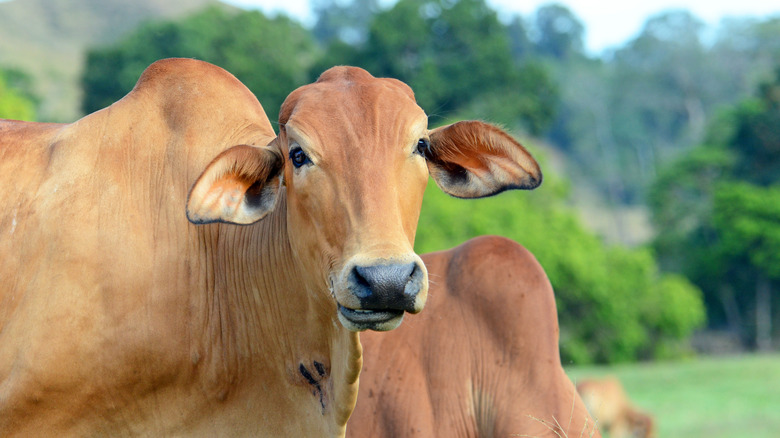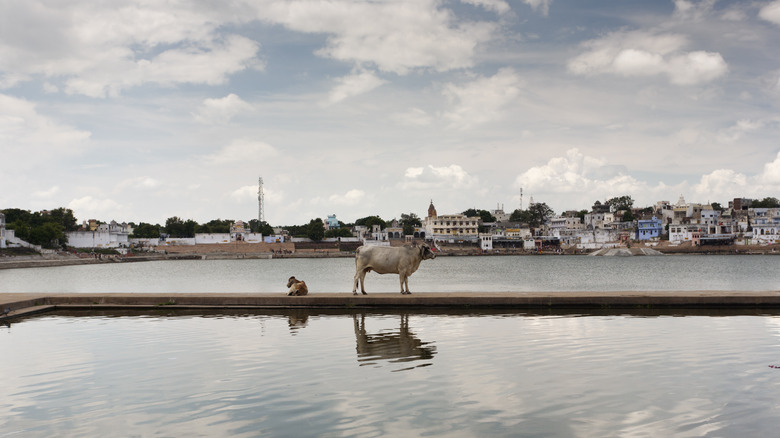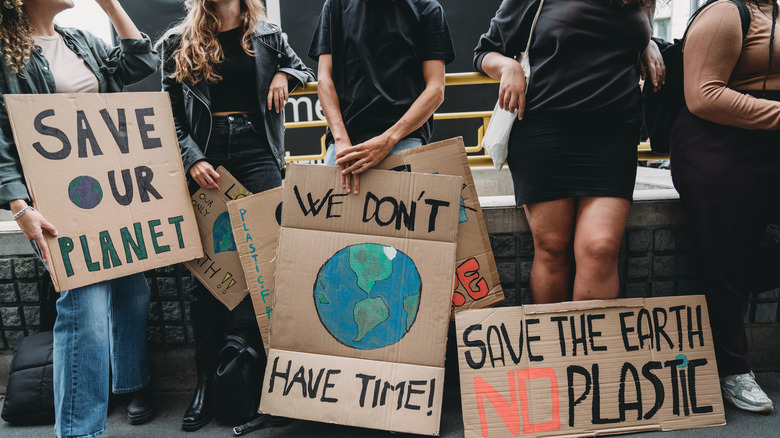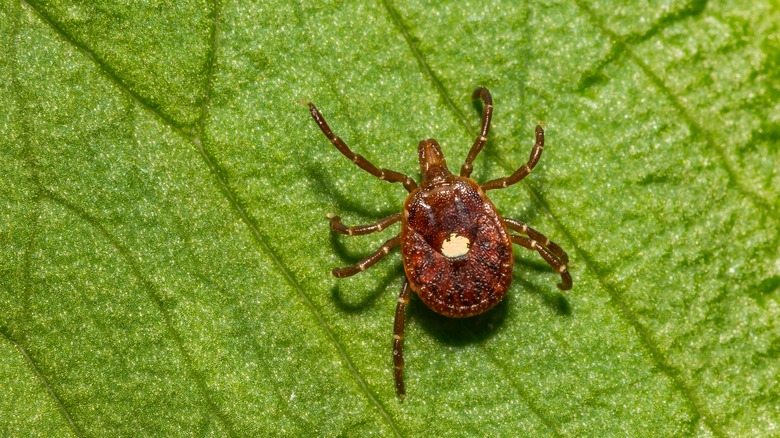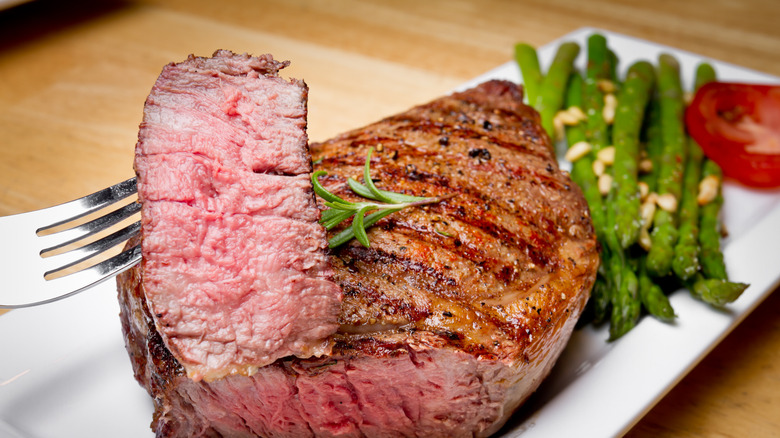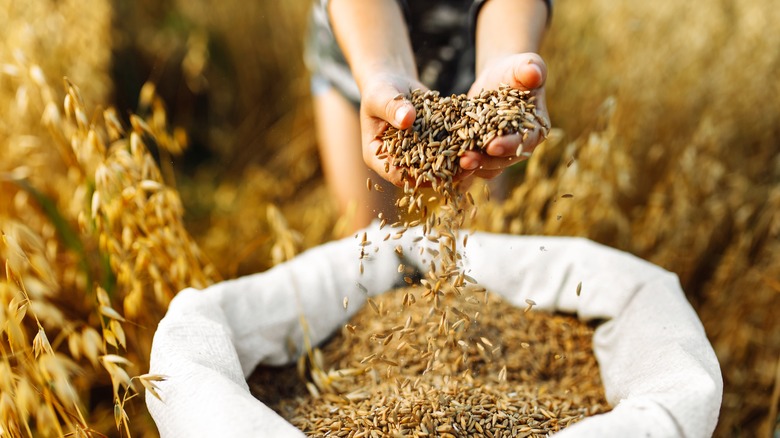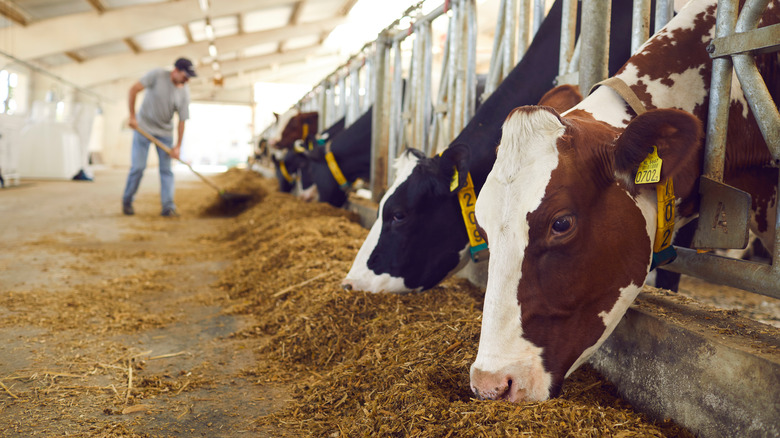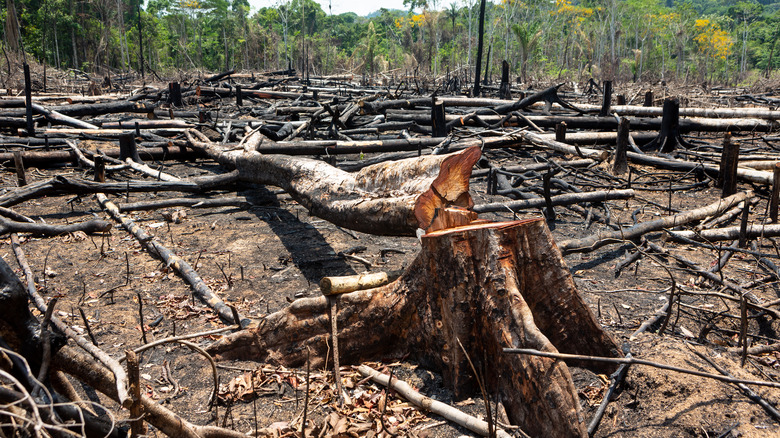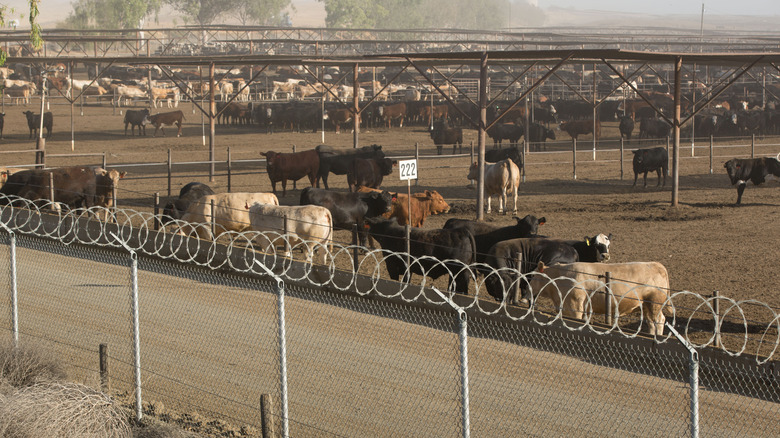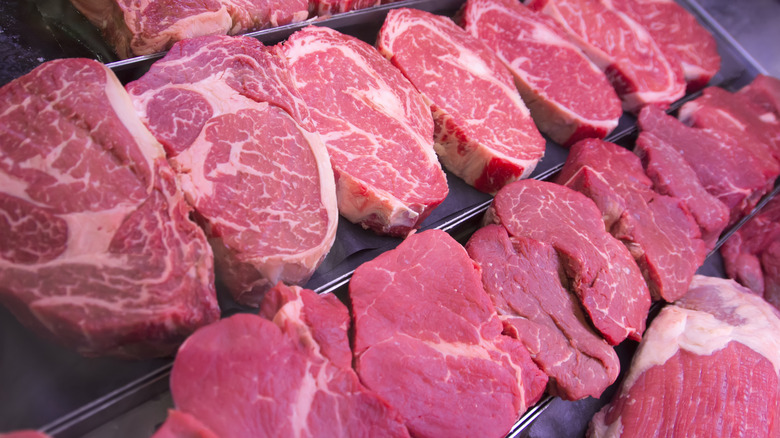Here's Why Millions Of People Don't Eat Beef
Beef, if we're to believe the advertising slogan, is what's for dinner. And judging from the popularity of burgers and steaks, beef certainly seems to be a standard –- and beloved –- part of the typical diet in the United States. In addition, the growing popularity of paleo and other high-protein diets has given beef a new cachet among some bodybuilders and fitness devotees.
But look more closely, and it's clear that not all diners enjoy beef –- or even acknowledge it as an edible foodstuff at all. For instance, Hinduism -– one of the dominant faiths of India -– considers cattle to be sacred and thus forbids the slaughter and consumption of cows. (Dairy products such as butter and yogurt, however, are more than okay –- indeed, the cow's ability to serve as a continuing source of nourishment for humans is among the reasons cattle are revered in Hinduism.) Even close to home, it's not hard to find people who consider beef-eating problematic. Practitioners of a number of other faiths, including Seventh-Day Adventists and Jains, refrain from eating any meat at all. Add to this the many people who reject beef for ethical or health reasons, and the club of people who have a beef with beef is pretty huge. When it comes to eating beef, there are plenty of reasons people say "thanks, but no thanks."
Beef wasn't always banned in the Hindu faith
Even if you have just a passing familiarity with Hinduism, you probably know about its veneration of cattle and prohibition against eating beef. The roots of the prohibition come from a legend related in a Sanskrit epic in which a king went hunting during a time of famine, and "the Earth assumed the form of a cow and begged him to spare her life; she then allowed him to milk her for all that the people needed."
But contrary to popular belief, beef was indeed eaten by observant Hindus in the early years of the faith, before the legend about the savior cow emerged. In the fourth century B.C., even after other faith groups in India turned to vegetarianism, written records showed that Hindus continued to raise cattle and eat beef. (They didn't do so indiscriminately, however – for the most part, only castrated steers were eaten, and female animals were only consumed for ritual purposes or served to honored guests). Even some early Hindu texts mentioned beef as a foodstuff. It was only later that the faith evolved to ban all beef consumption – and over time, the assumption that the ban was an original cornerstone of the faith took hold.
Over time, refraining from beef became a sign of status in Hinduism
Hinduism's prohibition against consuming beef did not randomly come into being overnight. Instead, like many customs, it spread gradually over a period of time. It first took hold among the higher castes in Indian society, who tended to embrace stricter dietary restrictions than the lower castes. The emerging prohibition against beef consumption among the higher castes likely stemmed from a combination of factors, including the association of cows with female purity and nurturing (since they selflessly provide nourishment to others through their milk) as well as the association of cattle with the Brahmins, the highest and most revered of the Hindu castes.
The association between the sanctity of cattle and the Brahmin caste led others to view the rejection of beef as a sign of high social status, and soon social strivers from the lower castes began to emulate the Brahmins and likewise stop eating beef. It's unclear whether this sacrifice actually improved anyone's lot in life, but it set the stage for what would become a full prohibition of beef consumption in the faith worldwide.
Many are foregoing beef to forestall climate change
Even those with no spiritual or religious reasons for rejecting beef can find it problematic for a number of reasons. In recent years, a major reason many diners have stopped eating beef (or are trying to reduce their consumption) is because beef production is known to contribute to climate change. Cattle generate methane — a greenhouse gas largely responsible for climate change – in their digestive tracts as the food they consume ferments. When the cattle belch, this gas enters the atmosphere, contributing to the greenhouse effect.
Believe it or not, there are indeed enough belching beef cattle out there to cause serious damage. Livestock production is responsible for around 15% of greenhouse gas emissions, and cattle are responsible for the overall amount of livestock emissions — around 65%. The problem is considered urgent enough that the popular recipe search site Epicurious has stopped publishing recipes containing beef. While some beef producers are attempting to mitigate the problem by feeding their cattle seaweed (which doesn't induce as much methane production) and using more sustainable farming methods, these small-scale and still-experimental efforts aren't enough to convince concerned diners to take up ordering steaks and burgers.
A tick bite can force you to take beef off your menu
Not all diners who avoid beef do so by choice. On rare occasions, even some who crave a good steak are forced to choose between their love of beef and their own lives and safety. And we don't mean the typical, sort-of-health-conscious diner who decides to temporarily cut down on burgers to lose a few pounds or lower their cholesterol: Some people develop an allergy to beef and dairy, and in some cases, beef consumption can trigger anaphylactic shock and potentially lead to death.
If you suddenly find yourself breaking into hives or getting short of breath after eating beef, the culprit may be a lone star tick. The bites of these pesky critters, which live in the Southeastern region of the United States, are known to trigger allergic reactions to alpha-gal, a sugar molecule found in red meat. It's still unknown exactly how tick bites cause the body to develop this allergy, but if you want to keep eating beef safely, use caution, wear insect repellent in tick-infested areas, shower, and check yourself carefully for any attached ticks as soon as you get home. And if this sounds too gross or like too much work, and you don't want to give up burgers because of a bug, it's probably best to avoid brushy, tick-infested areas altogether.
Beef intolerances can also be a problem for some diners
Most of us have had the experience of a certain food that just doesn't sit well with us. For some, the beans everyone else in their family loves leave them gassy and uncomfortable. For others, certain veggies are tricky to digest and invariably cause stomach aches. Or maybe your chili-head friend's favorite hot sauce makes both your tongue and your guts feel like they're going to melt. These reactions aren't technically allergies. Instead, they're food intolerances, in which the digestive system overreacts to some component of the food involved.
Beef is among the foods that some find difficult to eat without suffering uncomfortable repercussions later on. Those who suffer from beef intolerance may suffer from cramps, bloating, diarrhea, and fatigue, among other symptoms — but unlike beef allergies, beef intolerance is unlikely to lead to life-threatening problems. And fortunately for sufferers, a beef intolerance is often temporary, brought on by stress or environmental factors (including additives to meat), and many find that they can return to eating beef after taking a break from it for a while.
Health risks such as heart disease and cancer keep some away from beef
The rising popularity of high-protein, low-carb diets, such as paleo, keto, and Whole30 diets (and their variations) has led many to turn to beef as a go-to source of protein. Lean, grass-fed beef in particular has grown popular among followers of these diets, who believe it offers a healthy, clean source of both protein and fat.
But not everyone thinks beef is a wise nutritional source. "The bottom line is the health risks of consuming red and processed meat outweigh any benefits," Donald Hensrud, MD, director of Mayo Clinic's Healthy Living Program, told GQ. Among other things, the relatively high amounts of saturated fat and cholesterol in beef mean consuming beef increases one's chance of heart disease. In addition, consuming large amounts of red meat is thought to raise the risk of cancer (the heme iron found in red meat is thought to contribute to the production of cancer-causing compounds) as well as inflammation. If this weren't bad enough, heavy beef consumption is also associated with higher rates of obesity and the elevated rates of Type 2 diabetes associated with it. With all these risks, it's no wonder some health-conscious diners are shying away from beef.
Some believe beef production is an irresponsible use of food resources
Along with the many religious, environmental, and nutritional reasons to reject beef are a number of ethical concerns — such as the worry that beef cattle are literally taking available food from the mouths of hungry humans. Among the first to bring this concern to popular attention was activist and author Frances Moore Lappé, whose pioneering 1971 vegetarian cookbook "Diet for a Small Planet" argued that the grain used to feed cattle could be more productively used to feed people. "The estimate is that 80% of our agricultural land, including grazing for livestock, returns to us about 18% of our calories. That seems an extra-inefficient way to feed ourselves," Lappé told FoodPrint. "The way that we can eat in the plant world is so much more efficient, so much less wasteful."
Others agree. "More than half the U.S. grain and nearly 40% of world grain is being fed to livestock rather than being consumed directly by humans," David Pimentel, professor of ecology in Cornell University's College of Agriculture and Life Sciences, said in an address to the Canadian Society of Animal Science. "Although grain production is increasing in total, the per capita supply has been decreasing for more than a decade. Clearly, there is reason for concern in the future." So for some diners, foregoing beef to help ensure others have enough on their plates is an easy choice.
Conservation-minded diners worry about the impact of beef on water quality
Some diners are passing up beef because of concern about the impact of cattle production on water quality. If you've ever driven or walked by an industrial cattle feedlot and inhaled, it is obvious the cattle produce huge amounts of waste. And the enormous quantities of manure produced on most feedlots are far too much to simply scoop up and put in the trash. Instead, it's sprayed onto fields for dispersal or stored in open pit lagoons.
Neither of these are optimal solutions from an environmental perspective. Both can result in the manure releasing antibiotics, pesticides, bacteria, and heavy metals into the water and soil. And if manure disposal is done near sensitive watersheds, this puts water quality at even more risk. And you don't want any of these contaminants in your drinking water, nor in the natural waterways frequented by wildlife. In addition, cattle production impacts the quantity, as well as quality, of available water: The production of grain-fed cattle requires 100,000 liters of water (mostly for feed grain cultivation) for every kilogram of food produced, according to David Pimentel, professor of ecology in Cornell University's College of Agriculture and Life Sciences. In contrast, Pimentel added, potatoes require only 500 liters of water per kilogram of food produced.
The impact of beef production on the ecosystem is another concern
Concerns about environmentally responsible land use are another reason many are saying no to steaks and burgers. The simple fact is that cattle are big animals that require a lot of space, food, and other resources. And the growing demand for beef means a growing demand for land to raise cattle on, which has led to rapid, and often unauthorized, development of sensitive ecosystems into cattle ranches.
This growing trend has been especially noticeable in the Amazon rainforest, where the supply chain of a single large beef processor is thought to be responsible for the destruction of between 28,000 and 32,000 hectares of rainforest each year. This not only endangers the wide variety of plants, animals, and birds that call the Amazon rainforest home, but the welfare of the planet itself. The tall trees and lush vegetation of the rainforest serve a number of critical environmental functions, such as cooling the earth's surface by channeling heat high into the atmosphere and capturing and storing up to a quarter of the CO2 absorbed by the earth. Deforestation, however, has reduced the Amazon rainforest's carbon-capture capacities by 30% since the 1990s – yet another reason to think twice before eating beef.
Animal welfare activists see beef slaughter as cruel and unnecessary
There's yet another, more obvious ethical reason many people choose not to eat beef: It's not in the best interest of the cattle, nor their quality of life. For some, the very idea of taking the life of a sentient animal for food is unacceptable. For others, the manner in which cattle are raised and ultimately dispatched is needlessly cruel.
While pasture-raised cattle can lead relatively comfortable lives (until their untimely end, anyhow), these represent only a tiny fraction of the cattle raised for beef. Most beef cattle start their lives in pastures but are transferred to feedlots for fattening in the last six months of their lives. Not only are these feedlots cramped and dirty, but the cattle moved there are fattened on grain, which is much more difficult for them to digest than grass, and can cause discomfort and even illness. The lives of beef cattle only go downhill from there. The trip to the slaughterhouse often involves long travel in cramped trucks in extreme hot or cold, and while they might not know exactly what's up, many are panicked by the forced march into the cramped chutes meant to constrain them for slaughter. And while cattle are supposed to be stunned (and in principle, completely unconscious) before they are killed and butchered, stunning processes sometimes fail, and slaughterhouse workers have reported having to eviscerate or skin still-conscious animals.
A distrust of artificial hormones is another reason some avoid beef
It's no secret most beef cattle live far from natural lifestyles. Besides being physically constrained and subjected to unnatural diets (grain instead of grass) and often being separated from their family groups before sale or slaughter, they live artificially short – but accelerated – lives. While cattle can live as long as 15-20 years, beef cattle typically live only a year or two.
Because ranchers want to get as much saleable meat from their cattle as they can, it's a common practice in industrial beef production to treat beef cattle with growth hormones such as estrogen, typically administered as small pellets implanted under the skin by the ears. This practice is no secret, and is yet another reason some consumers are wary of beef: Can all those artificial hormones be passed on to beef-eating humans, and what effect will they have? The North Dakota State University Extension, however, says there's no need to worry – the hormones given to cattle are the same as those that occur naturally in all beef, and the amounts and types are strictly regulated by the USDA. While it acknowledges that hormone-treated beef does indeed have higher estrogen levels than non-treated beef, it's still less than the naturally occurring estrogen levels in other common foods, such as soy and eggs. Still, the very idea of forcing cattle into an unnatural growth spurt might be enough to make beef a no-go for some diners.
